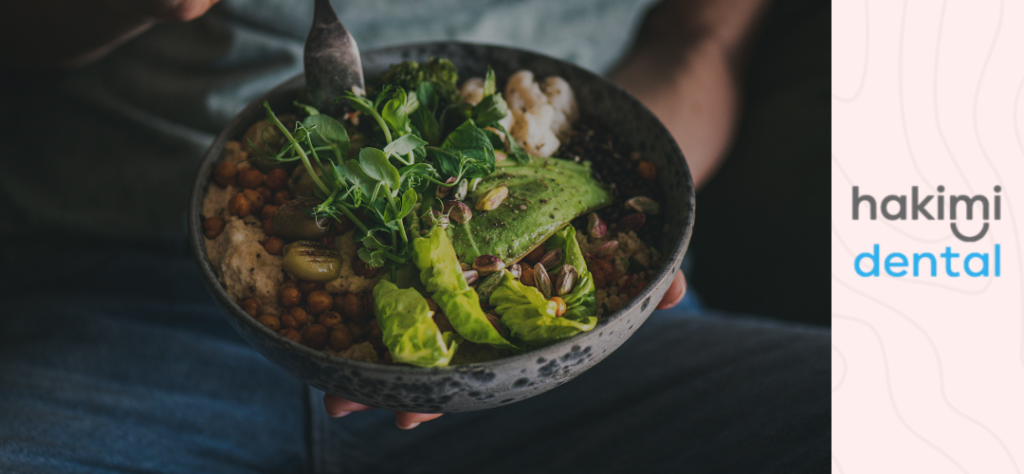Are you curious about how a vegan diet impacts your dental health? As more people embrace plant-based lifestyles, understanding how these choices affect our teeth and gums is vital.
This guide provides straightforward, expert insights into vegan dental health. We’ll walk you through common concerns, such as the potential negative effects of a vegan diet on your teeth, and offer practical tips to help you maintain a healthy, beautiful smile!

What is vegan dental health?
Vegan dental health focuses on the unique oral care needs of individuals following a vegan diet. Since vegan diets exclude all animal products, it is important for vegans to ensure they get essential nutrients from plant-based sources.
These nutrients are crucial not only for overall health but also for maintaining strong teeth and healthy gums. By carefully managing their diet to include a variety of nutrient-rich plants, vegans can support their dental health effectively, keeping their teeth and gums in good condition.
Nutritional considerations for vegans
One of the biggest challenges vegans face is ensuring they receive adequate nutrition that supports dental health. This section outlines key nutrients that are essential for maintaining strong teeth and suggests how to source them from a vegan diet:
Calcium: This mineral is crucial for strong teeth and bones. Vegans can find calcium in a variety of plant sources such as broccoli, kale, fortified plant milks, and tofu. Incorporating these foods into daily meals can help meet calcium needs effectively.
Vitamin D: Vitamin D is essential as it helps in the absorption of calcium. For those on a vegan diet, natural sunlight is a primary source, but it can also be obtained from supplements or fortified foods like plant-based milks and cereals. Regular intake can ensure that your body maximises the calcium absorbed from your diet.
Phosphorus: This nutrient works in tandem with calcium to enhance tooth enamel, which is vital for maintaining dental integrity. Phosphorus is plentiful in vegan-friendly foods such as nuts, seeds, and whole grains. Including these in your diet helps protect and strengthen your teeth.
Vitamin C: Known for its role in strengthening gums and the soft tissue in your mouth, vitamin C also helps in the prevention of gum disease. It is abundant in a variety of fruits and vegetables, including oranges, strawberries, kiwi, bell peppers, and broccoli. Regular consumption of these vitamin C-rich foods can bolster gum health and aid in maintaining overall oral hygiene.

Is being vegan bad for your teeth?
There’s a prevalent concern that adopting a vegan diet might negatively impact dental health. However, following a vegan lifestyle isn’t inherently detrimental to your teeth, as long as you maintain a well-balanced diet and adhere to good oral hygiene practices. To ensure optimal dental health, vegans should focus on consuming whole, nutrient-rich foods that provide essential vitamins and minerals needed for strong teeth and gums.
Issues such as enamel erosion or cavities can be particularly concerning for anyone, but these can be effectively managed in a vegan diet by making smart dietary choices. It’s important to limit the intake of sugary and acidic foods and beverages, which are known to weaken tooth enamel and increase the risk of decay. Additionally, incorporating plenty of fruits, vegetables, nuts, and seeds that are high in protective nutrients can help reinforce tooth enamel and promote overall oral health.
By paying careful attention to dietary choices and maintaining consistent oral hygiene—such as brushing twice daily, using fluoride toothpaste, and flossing—vegans can avoid common dental problems and enjoy a healthy, vibrant smile.
Can a vegan diet support good dental health?
Yes, a vegan diet can absolutely support good dental health. Key is ensuring adequate intake of specific nutrients that are vital for oral health. Vegans should prioritise calcium, vitamin D, phosphorus, and vitamin C in their diets, which are all available from plant-based sources. By combining a well-planned diet with regular dental care, vegans can not only maintain but also enhance their dental health, proving that a plant-based diet can be beneficial for the teeth if managed correctly.
Tips for vegan dental health
To make sure your dental health is in optimal shape when you are on a vegan diet, consider the following tips:
Regular dental check-ups: Visit your dentist at least twice a year for professional cleaning and check-ups.
Balanced diet: Focus on a varied diet rich in essential nutrients. Consider supplements based on your dentist or doctor’s advice.
Oral hygiene: Brush twice daily with fluoride toothpaste, floss regularly, and consider using a mouthwash to reduce plaque and bacteria.
Limit sugars and acids: Minimise foods and drinks that are high in sugars and acids to prevent tooth decay and enamel erosion.
Conclusion
Adopting a vegan lifestyle doesn’t have to compromise your dental health. With the right nutritional knowledge and diligent oral hygiene, vegans can maintain healthy and strong teeth.
Remember, every diet requires balance and attention to detail to support oral health! If you’re looking for personalised advice or have any concerns about how your diet might be affecting your dental health, we at Hakimi Dental Clinic are here to help.
Our team of friendly and experienced professionals is dedicated to ensuring that your dental needs are met with the highest standard of care.
Book an appointment today and let us help you maintain that healthy, vibrant smile.
Your smile is worth the effort!
FAQs
There is no direct correlation between a vegan diet and reduced plaque. Plaque formation is influenced primarily by oral hygiene practices rather than diet alone. However, a diet high in fruits and vegetables, as typical in vegan diets, can promote better oral health if combined with good oral hygiene.
Vegans are not inherently more prone to cavities than non-vegans. The risk of cavities is largely dependent on the consumption of sugary foods and drinks, and how well one maintains oral hygiene. Vegans who consume a lot of sugary or acidic plant-based foods and beverages may be at higher risk, just as with any diet high in sugars and acids.
A plant-based diet rich in vitamins, particularly vitamin C, can help improve gum health and, along with proper dental care, may aid in the management of gum disease. However, diet alone is unlikely to reverse established gum disease without comprehensive dental care and improved oral hygiene practices.
Veganism does not directly cause receding gums. Receding gums are typically the result of genetics, aggressive brushing, or periodontal disease. However, if a vegan diet is low in crucial nutrients like vitamin C and calcium, it could potentially contribute to gum health issues, including receding gums if coupled with poor oral hygiene.
Vitamin B12 deficiency is more common in vegans, as this vitamin is primarily found in animal products. B12 is crucial for overall health, and its deficiency can lead to various health issues, including potential impacts on oral health such as gum disease and canker sores.
